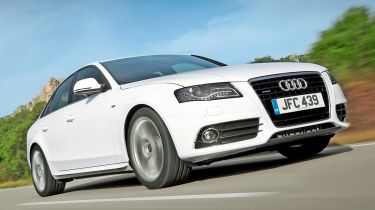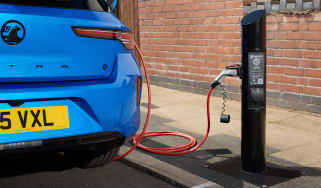Audi's Green Machines
Four rings has raft of green technology - saving fuel and cash

Unlike some rivals, Audi doesn’t currently have a specific green sub-brand.
However, it recently built the A4 Concept E – a model designed to be as fuel-efficient as possible. In fact, it manages to cut consumption to 70.8mpg on the combined cycle, and emit only 105g/km of CO2. These are remarkable figures for such a large and practical car.
Thankfully, the technology isn’t confined to show models, as you can opt for frugal versions of the A3 and A4. The former uses a 1.6-litre TDI diesel to emit 109g/km and return 68.9mpg; the latter has a 2.0 TDIe, and gives 120g/km and 61.4mpg.
It’s not only economy specials that are targeted in Audi’s quest for greater efficiency, however, as there is a number of fuel-saving devices in various cars across the four rings model range.
All TDI diesel engines use common-rail technology, which sees precise amounts of fuel being injected into the combustion chambers to maximise returns.
On 2.0-litre diesel and petrol models, Audi’s Start/Stop system is fitted. This works in the same way as rivals’ set-ups – killing the engine when you bring the car to a halt and release the clutch in neutral, and then firing it up again when you press the left pedal. The result of this is lower fuel consumption and CO2 emissions.
Larger diesels, such as the 3.0 TDI in the Q7 4x4, use a special catalytic converter and exhaust gas additive, called AdBlue, to remove nitrous oxide from the emissions. The formula is replaced when the car is serviced, so owners aren’t inconvenienced.
Diesel units aren’t alone in using clever innovations to reduce consumption, though. All Audis bar the R8, A8 and Q7 can be specified with the firm’s turbocharged T FSI engines, which were the first in the world to combine petrol direct injection and forced induction. This increases efficiency while offering more power.
Many cars in the range use what bosses refer to as Recuperation – this is Audi’s version of brake regeneration, and it engages the alternator when the car is coasting or braking, before feeding the energy into the battery. It’s used to run on-board gadgets, so they don’t steal power from the engine.
The company expects this to boost economy by up to three per cent.
Plus, before all this technology is fitted to any Audi, the brand uses aluminium extensively in its models’ chassis and bodywork to keep weight down, and in turn boost efficiency.
BEST ECO BUY: A4 2.0 TDi


